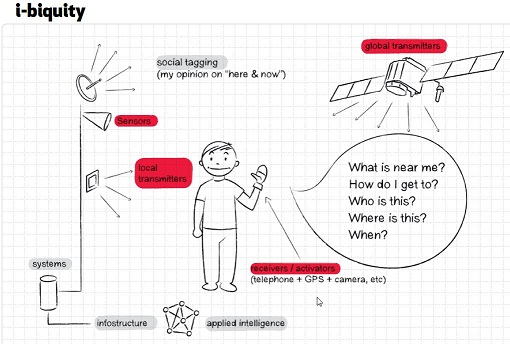
i-biquity
One of our principal concerns in these times of information overload
is how to avoid information anxiety, or at least, how to reduce
it. In other words, how to find qualified information that helps
us to discern, from the many options available, which is the best at a
given time and place. It is the time of relevant versus exhaustive, and
of relevance in real time. Of finding the information we need, at the
right time: which here I call i-biquity.
The Internet’s current aim of ubiquity, with the objective of connecting
you wherever you are at whatever time, will soon be overtaken by
the need to guarantee that its users can access the information they
need to be efficient (the source of personal productivity) at any time
and from any location, whilst enjoying a better quality of life.
For example, when I am waiting on a platform in the underground,
the information I need is when the next train will arrive. It is great
that I can access a television screen that will tell me what’s happening
on the other side of the world, but what I really need to know is the
time of the next train. This information contributes to reducing my
information anxiety. Moreover, I ought to have this information about
the next train while I am still in the street, so I can decide if I want to
take the underground according to my time constraints. At a bus stop
I would like to be able to draw the beginning and end of my journey
on the bus map, using only two fingers (one from each hand), so that
the system can tell me (answer me) which are the best connections
between those two points, allowing for the current traffic volume,
and the time I will need to complete my journey.
If I decide in the end to take a taxi, I would like to be able to speak
directly on my mobile phone to the nearest available taxi, not with
the headquarters of the largest firm. If I choose to cycle, I want to
know where the nearest public bike-hire centres are, and how many
bikes are available at this precise moment in each one (in real time).
If I drive, I will need my GPS to tell me where I should slow down
(informing me, not penalising me). And, when I get out of the car, I
want to know where to find the product I’m looking for at the best
price, with some sort of GPS for localising products in the immediate
area (proximity marketing). If I’m on the train, I’d like to be able to fall
asleep knowing that my mobile, GPS enabled, will alert me with an
alarm when we are nearing the station where I want to get off.
The development of the concept of i-biquity will require, as we can see
from these examples, a combination of hardware that we carry with us,
and software that stimulates the interface between us and the hardware.
Some of these pieces of necessary hardware will be built into the instruments
that we already carry around with us, like our telephones and
watches, or hybrid forms of these, but others will be totally new. These
will inevitably stimulate the emergence of a whole new industry.
from my book: Visionomics



